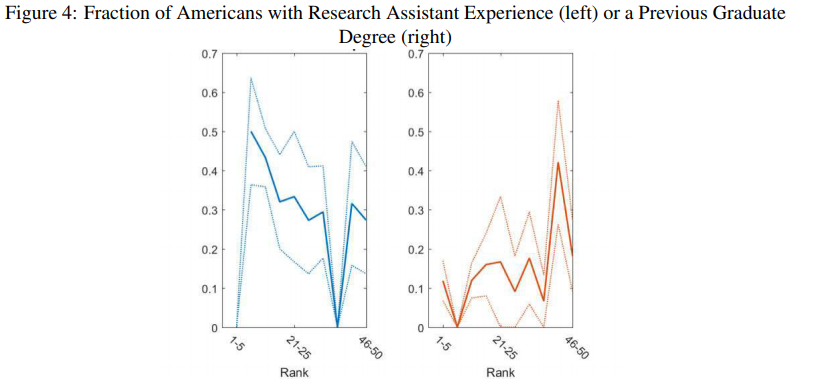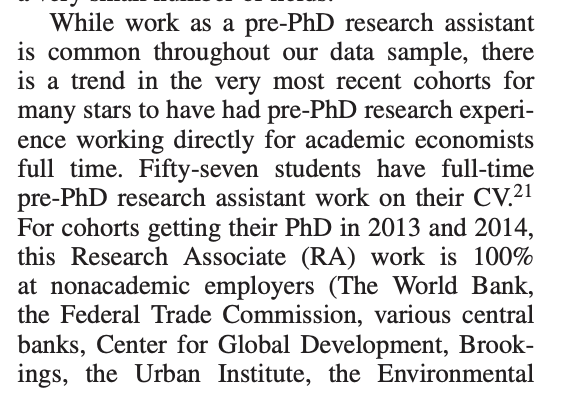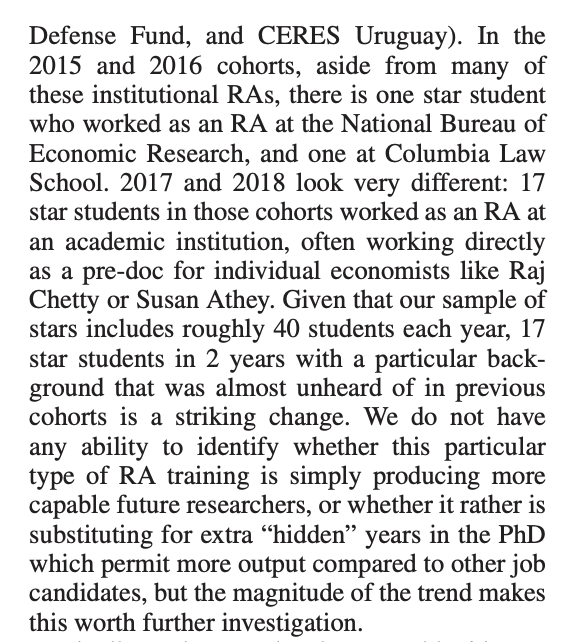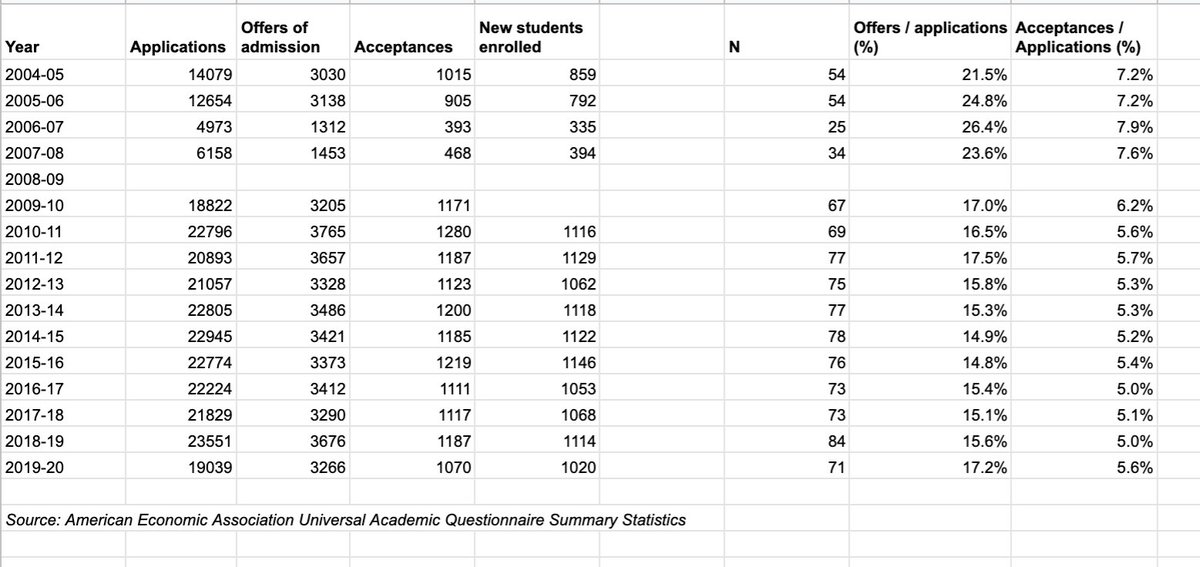Hello! I wrote a piece in @TheEconomist about pre-docs and there was MUCH more than I could fit in the piece
(if only the ratio of interview notes to words in the piece was a thing...)
I& #39;m going to attempt a mega-thread over several days. https://www.economist.com/finance-and-economics/2020/08/08/what-it-takes-to-become-an-academic-economist-is-changing">https://www.economist.com/finance-a...
(if only the ratio of interview notes to words in the piece was a thing...)
I& #39;m going to attempt a mega-thread over several days. https://www.economist.com/finance-and-economics/2020/08/08/what-it-takes-to-become-an-academic-economist-is-changing">https://www.economist.com/finance-a...
First of all, THANK YOU to
@PeterBlairHenry
Camille Gardner of @PhDEI_Econ
@paulineyliang @DomRussel and @zonghuang for doing a pre-doc survey
Raj Chetty for telling me about @OppInsights
@rtoseland (Yale)
Michael Greenstone (U Chicago)
I spoke to others - MORE THANKS TO COME
@PeterBlairHenry
Camille Gardner of @PhDEI_Econ
@paulineyliang @DomRussel and @zonghuang for doing a pre-doc survey
Raj Chetty for telling me about @OppInsights
@rtoseland (Yale)
Michael Greenstone (U Chicago)
I spoke to others - MORE THANKS TO COME
SO. First of all, the idea that people do research pre-PhD is NOT NEW. Places like the Fed, the World Bank or Brookings have been offering research assistantships for aaages.
Dick Startz kindly shared this with me - also shout out to pre-doc @GarrisonSchlau1 who helped too. Around HALF of Americans at the top 5 institutions who went on the job market in 2016-17 had research assistant experience.
What DOES seem to have changed is the number of "pre-doc" slots at the most elite academic institutions. (I also heard that the Fed expanded their scheme a lot.)
These are typically two year research-fellowship-learning experience things - essentially you& #39;re a research assistant
These are typically two year research-fellowship-learning experience things - essentially you& #39;re a research assistant
Thanks to Kevin Bryan ( @Afinetheorem) for his paper on young stars in economics
http://kevinbryanecon.com/YoungStars.pdf ">https://kevinbryanecon.com/YoungStar...
http://kevinbryanecon.com/YoungStars.pdf ">https://kevinbryanecon.com/YoungStar...
My sense is that the pre-docs trend has accelerated more recently. I heard about programmes tripling in size over the past 5 years. But as far as I know, no one has collected the data systematically. And I worry a bit about RAs just being rebranded as pre-docs.
Accepting that pre-docs have grown, WHY??
My conversations suggest...
Greater DEMAND for empirical work smart 22 year olds can do
More funding
Offer of pre-docs is a way to attract top researchers (hi UChicago)
A formal programme is less hassle for profs to hire from
My conversations suggest...
Greater DEMAND for empirical work smart 22 year olds can do
More funding
Offer of pre-docs is a way to attract top researchers (hi UChicago)
A formal programme is less hassle for profs to hire from
WHY have pre-docs grown?? (cont.)
A SUPPLY of willing young researchers wanting to know if economics is for them.
People wanting an opportunity to take real analysis courses.
Or get research experience.
Or... get a letter of recommendation.
A SUPPLY of willing young researchers wanting to know if economics is for them.
People wanting an opportunity to take real analysis courses.
Or get research experience.
Or... get a letter of recommendation.
I heard a theory that this was a function of increasing supply of people wanting to do PhDs, so people were having to work harder to signal their (RELATIVE) competence. But I couldn& #39;t find strong evidence to back this up.
Here are the PhD application/admission statistics. (Note the change in sample size before/after the great recession, which makes me worry that the numbers aren& #39;t comparable.)
Let& #39;s talk about the pre-doc APPLICATION process.
The programmes at the most prestigious universities are very competitive. Maybe 500-600 applications for something like 10-20 spots.
The programmes at the most prestigious universities are very competitive. Maybe 500-600 applications for something like 10-20 spots.
Let& #39;s talk about the pre-doc APPLICATION process.
The programmes at the most prestigious universities are very competitive. Maybe 500-600 applications for something like 10-20 spots.
The programmes at the most prestigious universities are very competitive. Maybe 500-600 applications for something like 10-20 spots.
I heard that in some programmes, existing pre-docs designed the application test themselves, or came up with candidate shortlists
RISK: that the students design unreasonably hard tests that assess skill rather than potential, or that they pick applicants who look like them
RISK: that the students design unreasonably hard tests that assess skill rather than potential, or that they pick applicants who look like them
When I spoke to profs, I learned...
- the student input varies across programmes
- there do seem to be some safeguards in place, eg one said he reviewed all applications from all URMs
- the student input varies across programmes
- there do seem to be some safeguards in place, eg one said he reviewed all applications from all URMs
The application involves normal academic stuff, a cover letter and an interview. According to the survey by @paulineyliang @DomRussel and @zonghuang, for 77% of respondents at the top 7 academic programmes it involved a coding test.
On the one hand, it could be an equaliser - doing well doesn& #39;t rely on your connections, it relies on you being good at coding. (Conditional on getting through to the coding stage ofc.)
On the other hand, not everyone has access to the classes or the right software. From the same survey, half of those who did the test had to use a specific programme. Four fifths ended up using Stata ($)
I heard concerns that the LENGTH of some of the coding tests could put off applicants. For 20% of the pre-docs at the top 7 programmes, their test lasted 10-14 hours. Now imagine applying to multiple programmes... or not.
gah - mis-pasted one of the tweets above. Meant to type that I heard concerns about applications moving earlier and earlier, as well as exploding offers where students had to decide whether to reject/accept an offer before they had heard back from everywhere.
More later. ok NOW I& #39;m going on holiday.

 Read on Twitter
Read on Twitter





